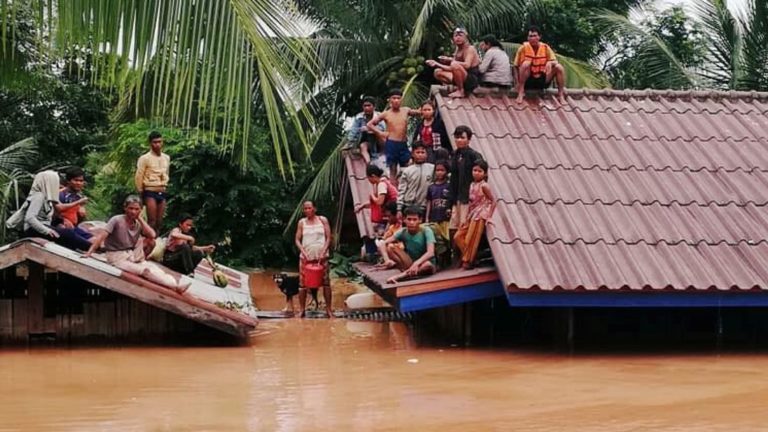Civil society network in Thailand demands responsibility from Thai investors in hydropower
By: ajcarapella

By Chiang Khong Conservation Group, a Waterkeeper Alliance Affiliate
We are representatives from communities affected by Thai investment abroad, a network of river communities, non-governmental organizations, Thai foundations (concerning poor human rights practices of Thai investors abroad), and civil society organizations in ASEAN countries. We are concerned about the lack of responsibility of Thai investors to provide remedies and compensation.
We have been monitoring the situation at the XeNamNoy Dam and offer condolences for the loss of the great people of Laos. The situation raises the question of the responsibility of Thai investors.
We demand the Thai Investor, Ratchaburi Electricity Generating Holding Public Company Limited — a subsidiary of the Electricity Generating Authority of Thailand — be responsible for the damage caused by the failure of the XeNamNoy saddle dam. This includes over 6,000 people who lost their lives, homes, property, and agricultural lands and encountered psychological damage due to the loss. We demand responsibility be taken as soon as possible according to international principles and human rights standards.
The recent XeNamNoy dam collapse in Attapeu province, Lao PDR has caused enormous damage and raises high alarm calling for greater responsibility of Thai investors in outbound investments. The 410 MW XeNamNoy Dam is located in Attapeu province. The dam involved Thai investor Ratchaburi Electricity Generating Holding Public Company Limited (25% share), Korean, and Singapore investors. The dam would export 90% of its electricity to Thailand. The dam would start commercial operation in 2019. Electricity Generation Authority of Thailand (EGAT) is the power buyer and four big banks in Thailand provided funding for this project — Krung Thai Bank, Tanachart, Export-Import Bank of Thailand, and Bank of Ayudhaya (Krung- Sri).
The dam collapse on late Monday night sent flash floods through 6 villages and 6,000 people became homeless. Approximately 200 people are missing and 50 people have been reported dead. Ratchaburi Electricity Generating Holding PCL announced that the earthen dam showed cracks after a rainstorm continued. The overflow of water from the dam destroyed lives, property, and agricultural lands of the communities and hundreds are still stranded on roofs and in trees waiting for the rescue operation. The company confirmed the breach would not affect the power generation schedule. But it has not expressed adequate concern or announced measures to address the impact of the dam breach on local people and communities.
The saddle dam collapse raises questions about the construction process and compliance with the world’s best practices and dam standards and safety. The principles and guidelines of the World Commission on Dams suggest mechanisms should be developed to make indemnity or compensation retroactively to those suffering from existing dams and to restore the damage.
We ask Thai investors abroad to learn from the case of XeNamNoy Dam. It shows the need to develop dam safety as the first priority in all planned dams. In addition, a comprehensive assessment of the existing dams should be put in place before building new dams on the Mekong and its tributary rivers. Several measures must be carried out as soon as possible to take responsibility according to international best practice standards and human rights principles.
Recommendation for the Lao Government:
- We urge the government of Laos to order an investigation regarding what caused the collapse of the dam and to create measures to avoid reoccurrence of similar incidents. The assessment should be done by an independent expert or third party.
Recommendations for the investors:
- We demand the companies be responsible for compensation and remedies to the communities suffering losses. The companies must engage communities in discussion about compensation and appropriate remedies as soon as possible.
This statement calling for greater responsibility by Thai investors for their investments abroad is based on the Guiding Principle of Business and Human Rights (UNGP). Investors must respect affected communities’ rights to remedies, include affected communities in compensation discussions, and provide fair and just compensation and remedies to affected communities.
Endorsed by:
- People’s Network Thailand 8 Mekong Provinces (Network of Thai Mekong People in 8 provinces)
- Chiang Khong Conservation Group, a Waterkeeper Alliance Affiliate (Rak Chiang Kong Conservation Group)
- Association of Rivers for Life (Living River Siam Association)
- Freedom Mekong River (Mekong Butterfly)
- Extraterritorial Watch Coalition
- Foundation for the Environment and Natural Resources (Foundation for Environment and Natural Resources)
- Foundation Community Information Centers (Community Resources Centre Foundation)
- Community institutions Mekong (Mekong Communities Institute)
- Earth Rights International
- Sika University (Spirit in Education Movement (SEM))
- Conservation Group Events
- The network of community organizations in the Greater Mekong Region 7 East (B. c.)
- Network Association of Community Organizations Mekong 7 in the Northeastern region
- Coordination Center in Nong Khai Development Party (JST Fri.)
- Mekong Group Hug
- Train community organizations Kan province
- Community network of water repeatedly. E. Ratchathani
- The faculty, students, and citizens to society and the environment
- Takapaw Youth Group
- Dawei Watch Foundation
*Feature image by Sky News